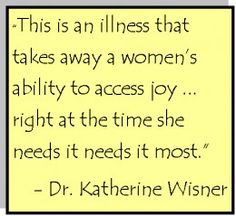How do I beat postpartum depression? What is postpartum depression and what can you do about it? What to do when you have postpartum anxiety? If you have postpartum depression , prompt treatment can help you manage your symptoms and help you bond with your baby.
With postpartum depression, feelings of sadness and anxiety can be extreme and might interfere with a woman’s ability to care for herself or her family. Mothers with postpartum depression experience feelings of. Learn the basics of postpartum depression. Find in-depth information on postpartum depression including causes, symptoms, diagnosis, and. Do you have postpartum depression?
Learn about the risks, symptoms and treatments from the experts at WebMD. While some women are predisposed to experiencing postpartum depression , PPD can affect anyone, including women who experience a normal delivery and give birth to a healthy child. Since a personal history of depression can increase the risk of postpartum depression , let your doctor know if you have struggled with depression or anxiety in the past. Ask your doctor or therapist about local support groups for new moms or women who have postpartum depression.
Symptoms include a feeling of being overwhelme frequent crying, and fatigue. If you have depression , then sa flat, or empty feelings don’t go away and can interfere with your day-to-day life. Because it is difficult to identify any one particular cause of postpartum depression , it is better to isolate certain factors that put woman at a greater risk of developing PPD. Risk factors that may contribute to postpartum depression include genetics and environmental, emotional and physical influences.
If you are having thoughts of hurting yourself or your baby, take action now: Put the baby in a safe place, like a crib. Call a friend or family member for help if you need to. It requires treatment, and the good news is that good treatment is available.

The specific treatment you. We know what it’s like and we know how hard it is. Here are some of our best resources for moms with postpartum depression , postpartum anxiety and related illnesses: List of postpartum depression treatment specialists and. Postpartum Depression Help. Learn more about PP the most common complication of childbirth.
It covers the signs, symptoms and causes of postpartum depression , when to seek treatment from a health care provider and the use of antidepressants and talk therapy. Women with postpartum depression have intense feelings of sadness, anxiety, or despair that prevent them from being able to do their daily tasks. When does postpartum depression occur?

The aim of this study was review of the related studies. In this narrative review, we report studies that investigated risk factors of postpartum depression by searching the. The 10-question Edinburgh Postnatal Depression Scale (EPDS) is a valuable and effici ent way of identifying patients at risk for “perinatal” depression. How long postpartum depression usually lasts. While most people recover from it within the first six months, an estimated to of people experience it for longer.
PPD may make it hard to take care of yourself and your baby. What are signs and symptoms of postpartum depression like? Like all types of depression , this is not the result of a character flaw, weakness, or anything the mom.

PPD symptoms can include any of the following:. Take lack of sleep, change in the entire dynamics of life, a baby who depends on you and demands a lot of time — putting. Many new moms get the baby blues, but some face postpartum depression (PPD) – a serious condition.
Find out whether you may have PPD and what you can do about it. Without treatment, it can last for months or years.
No comments:
Post a Comment
Note: Only a member of this blog may post a comment.